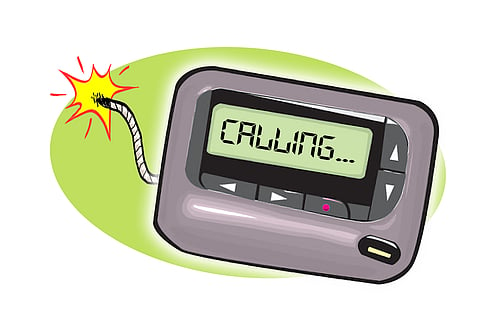
- NEWS
- the EDIT
- COMMENTARY
- BUSINESS
- LIFE
- SHOW
- ACTION
- GLOBAL GOALS
- SNAPS
- DYARYO TIRADA
- MORE

By all indications, pagers and walkie-talkies exploding in the faces of people across Lebanon and Syria in what seemed like a coordinated attack by Israel’s Mossad secret service last 18 September signaled a new dawn in covert warfare.
Almost immediately, radios and pagers were banned from flights taking off from Beirut airport and it is apparent the incidents have provoked fears the tactic could spill over to tablets, mobile phones, laptops, smartwatches and other tech devices commonly used daily by millions.
Kareem Shaheen, New Lines magazine’s Middle East and Newsletters editor, said there is much to analyze in the bloody maiming incidents which he described as “a new Orwellian form of warfare and violence that has redefined the meaning of a precision strike, along with memes of schadenfreude by those that Hezbollah has cowed and bullied for decades.”
Hezbollah, which functions as a proxy for its major benefactor, Iran, and which violently opposes Israel and Western powers in the Middle East, wields power in Lebanon where it is both a Shiite Muslim party and a militant group.
To recall, in solidarity with Gaza, it launched rockets into northern Israel as the Israeli government began its campaign in the Palestinian enclave in retribution for Hamas’s 7 October attacks.
No doubt the pager bombs — the fact that Israel had infiltrated its supply networks, blasted thousands of its operatives (and unfortunately, civilians as well) and damaged its internal communication capability — has dealt Hezbollah a major blow.
It was a unique operation that manifested Israel’s technological capabilities as well as its capability to infiltrate Hezbollah’s network, and Iran’s, for after all it was the latter that supplied the pagers to Hezbollah.
The depths of Israel’s infiltration are not only clear, but its ability to target so many operatives simultaneously without the need of sophisticated technology to track them is both unsettling and embarrassing for Hezbollah.
But what about the rest of the population, and indeed the world beyond which now wonders whether technology can be used to conduct such clandestine, low-cost but terrifyingly effective warfare?
What of the potential for more sophisticated devices that are everywhere, instead of pagers that haven’t been in wide circulation since the 1990s?
American whistleblower Edward Snowden, who had exposed National Security Agency abuses in 2014, tweeted, “If it were iPhones leaving the factory with explosives inside, media would be a hell of a lot faster to cotton on to what a horrific precedent has been set. Nothing can justify this; it’s a crime, and everyone in the world is less safe for it.”
It is not hard to imagine worst-case scenarios in popularizing the use of such technology, whether among ordinary tech geeks or rogue states because the world has already witnessed the worst-case scenario.
The fact is explosives were planted inside pagers that exploded but tech journalists say even normal cell phones could technically have their batteries triggered remotely to overheat and blow up.
It is easy to visualize electronic devices programmed to trigger a blast being brought on public transport, including airplanes.
The ramifications of the attacks go far beyond the Middle East. For instance, WiFi is used on international flights to give passengers access to entertainment and news through their phones, tablets, and laptops.
Now, posed to security experts is the question if the operation undertaken could be replicated on mobile phones and other electronic devices.
Who needs to put on an underwear bomb to bring down an airplane if a signal could overheat, if not detonate, hundreds of tablets and/or phones at 30,000 feet ?
Asks former Pentagon official and now American Enterprise Institute and director of policy analysis at the Middle East Forum, Dr. Michael Rubin, “Do computers and phones have to be turned on to receive a signal that would cause a detonation?”
What happened in Lebanon should put the world on alert. It’s not easy to predict how somebody, let alone society as a whole, would react to events that trigger a sense of danger lurking around a corner or in the pocket of a man lining up with you at a supermarket checkout counter.
Hezbollah may have been the target of the exploding pagers, but that incident could very well have in the near future a chilling deleterious impact on not only the aviation industry but on other businesses — nay, the whole world — as well.
